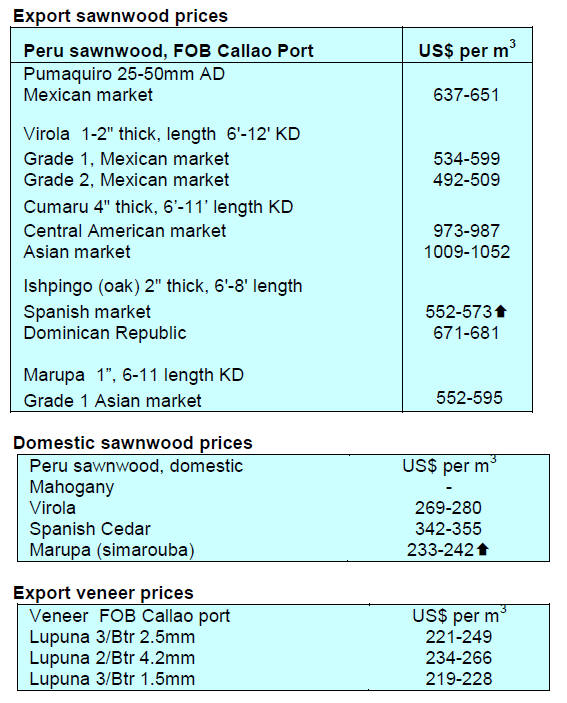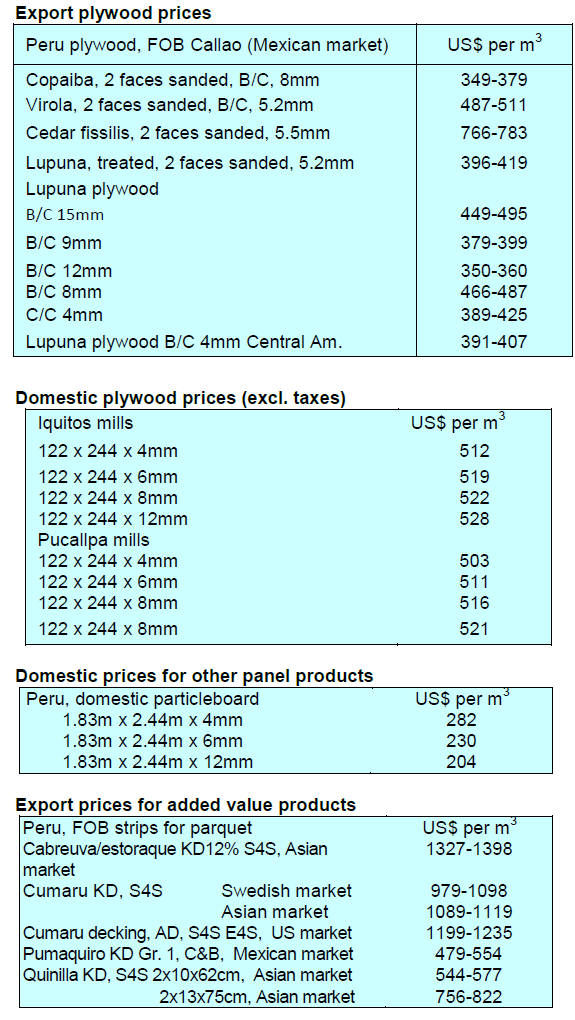2.
GHANA
Government urged to implement policies to support domestic
manufacturers
The Association of Ghana Industries (AGI) has called on government to adopt
policies more favourable to the manufacturing sector so the sector can
contribute more to the ‘Ghana Beyond Aid’ agenda.
This was disclosed by the President of the AGI, Dr. Yaw Adu Gyamfi, at a
conference on the theme ‘Attaining Ghana Beyond Aid: Prospects and
Challenges’.
Contributing to the discussions on the transformation of the manufacturing
sector, Dr. Adu Gyamfi urged government to revisit and review some of the
policies in the 2011 Ghana Industrial Policy to promote industrial
transformation.
He noted that the ‘Ghana Beyond Aid’ agenda can be achieved if the
government’s One-District-One-Factory (1D1F) flagship programme engages and
focuses more on the promotion of the local manufacturing sector rather than
the current focus on attracting foreign companies.
See:
https://agighana.org/news_details.php?nw=172
Communication tool to promote wood products
Timber enterprises have designed a new communication/promotional tool
“Message House” aimed at increasing the awareness of buyers, especially
those in the EU, of Ghana’s capacity to deliver a range of wood products.
This initiative comes at a time when Ghana is at the final stages of
satisfying all conditions of the Voluntary Partnership Agreement (VPA) with
the EU. The ‘Message House’ initiative will build on Ghana’s commitment to
export verified legal and FLEGT certified wood products.
The Kumasi Wood Cluster (KWC) and the Ghana Timber Millers Organization
(GTMO), with the support of the FAO-EU FLEGT Programme, have begun a project
‘Development of private sector-focused messages for Ghana’s FLEGT license
communication strategy’.
See:
https://www.gbafrica.net/the-timber-sector-in-ghana-discovers-communication-strategies-to-seize-eu-opportunities/
World Bank financial agreement includes forestry sector
Ghana has recently signed four agreements with the World Bank worth over
US$500 million to be used to help transform Ghana’s economy. Included in the
planned investments is an element to reduce forest losses and degradation.
At the agreement signing ceremony Pierre Laporte, the World Bank’s Ghana
Director, commended Ghana for its longstanding and strong partnership with
World Bank. In responding, Finance Minister Ofori-Atta, emphasised the
government’s focus on reforms would reposition the private sector as engines
of growth.
See:
https://www.mofep.gov.gh/news-and-events/2020-01-21/government-and-world-bank-group-sign-financial-agreement-for-four-projects
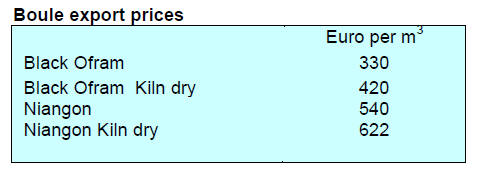
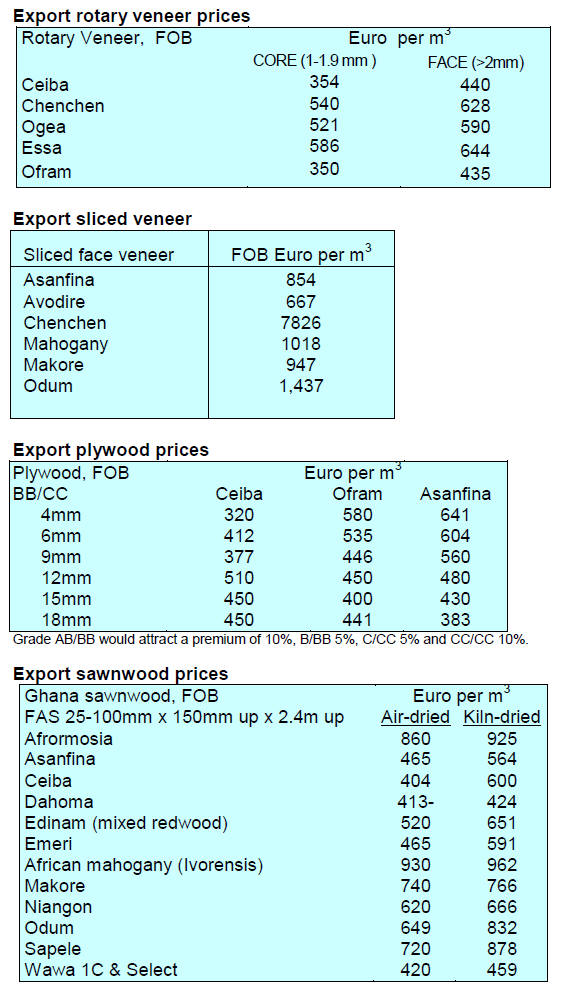
3.
MALAYSIA
Mood of pessimism among the timber
exporters
The talk in the timber industry, indeed in most of the industrial sector is
on the coronavirus and how it will affect business.
Trade analysts in Malaysia report a mood of pessimism among the timber
exporters with some anticipating “very bad business” as the disruptions from
the latest coronavirus outbreak are weakening an already disrupted global
market.
Prior to the coronavirus outbreak becoming an epidemic, the Federation of
Malaysian Manufacturers (FMM) urged the government to bring forward its
planned stimulus packages to address the risks Malaysia faces from the
US-China trade dispute.
The measures proposed to diversify Malaysian exports include intensifying
the buy ‘Made-in-Malaysia’ campaign, concluding the Regional Comprehensive
Partnership Agreement (RCEP) and implementation of free trade agreements
such as the Comprehensive and Progressive Agreement for Trans Pacific
Partnership (CPTPP). The FMM called for a further range of measures to
protect Malaysian exporters and manufacturers.
China has been Malaysia’s largest trading partner for a decade and trade
reached over RM300 bil. last year. This trade is now at risk according to
the president of FMM as China’s imports are set to be considerably lower
especially in the first half of this year.
Read more at
https://www.theedgemarkets.com/article/fmm-calls-expeditious-antivirus-shot-putrajaya
Legal status of forest community established
At the Sabah State Assembly sitting in November last year, the Assembly
passed amendments to the Forest Law (Constitution of Forest Reserves and
Amendments 1984) which came into force in December 2019.
The amendment in 2019 was to de-gazette 1,637 ha. of forest reserves and
gazette 2,154 ha. as new permanent forest reserves.
The state government wanted to de-gazette the 1,637 ha. of forests reserve
because of long-established human settlements there. The area classification
has changed from the ‘forest reserves category’ and will be re-gazetted
under the Land Ordinance for the purpose of kampung (or village) reserves.
These areas involve at least 90 settlements with about 3,800 houses and
20,000 residents.
Sarawak 2019 log exports
The latest data shows that the volume of logs exported in 2019 was 1,290,133
cu.m, worth RM722,216,788. The species which contributed the most value was
meranti at RM299,751,936 (402,971 cu.m). By comparison, the total volume of
logs exported in 2018 was 1,418, 742 cu.m, worth RM 773,448,482.
In 2019 the second most valuable timber was acacia mangium at RM123,709,614
(558,504 cu.m) and the third was kapur at RM83,906,280 (79,129 cu.m). Other
export species were selangan batu RM83,598,818 (56,740 cu.m), MLH (Mixed
Light Hardwoods) RM51,993,533 (96,140 cu.m) followed by keruing RM40,858,543
(47,592 cu.m).
MIFF 2020 to be held as planned
The organiser of the Malaysian International Furniture Fair has issued a
statement saying MIFF 2020 will be held as scheduled from March 6 to 9,
2020.
The organiser, Informa Markets, will implement precautionary hygiene
measures at the two show venues, the Malaysia International Trade and
Exhibition Centre (MITEC) and Putra World Trade Centre (PWTC) and will work
to support the nation-wide preventive action taken by the Malaysian
Government.
Medical personnel will be on standby at the two venues throughout the show
for health screening.
4.
INDONESIA
Overburdening regulations blamed for
fall in investment
The Indonesian Furniture and Crafts Industry Association (HIMKI) Secretary
General has said the decline in foreign investment in the wood processing
sector last year was largely because of the complexity of government
regulations.
The Association considers that the Omnibus Law can help increase investment
absorptions. The Indonesian Investment Coordinating Board reported that in
2019 domestic investment in the timber sector increased slightly but that
foreign investment dropped over 65% from US$276 million in 2018 to US$95
million in 2019.
HIMKI Secretary General, Abdul Sobur, said under the present conditions
Indonesia cannot compete with Vietnam in attracting foreign investment.
Sobur pointed out that the so-called Omnibus Law which has been drafted is a
step in the right direction in efforts to attract investors.
See:
https://ekonomi.bisnis.com/read/20200130/257/1195527/regulasi-rumit-sebabkan-investasi-mebel-turun
Indonesian returns to Internationale Möbelmesse
Indonesian furniture products returned to the European international
exhibition, Internationale Möbelmesse (IMM) 2020, one of the largest
exhibitions for furniture makers and designers.
Eight Indonesian furniture companies joined the Indonesian Pavilion and
achieved positive reviews and attracted significant orders. Indonesia missed
the previous IMM and Risnawaty, the Head of the Indonesian Trade Promotion
Center in Hamburg said the participation in this exhibition introduced the
uniqueness of Indonesian handicraft and furniture products.
The Director of National Export Development, Dody Edward, commented that,
while visitors to IMM come from around the world, Europe is still the main
market for Indonesian furniture.
Indonesia needs permanent solution to forest fires
In 2019 Indonesia lost almost 2 million hectares of its forests and peat
land to fires at a cost of over US$5 billion according to the World Bank.
Because most fires are the result of human activity the Indonesian President
has demanded a permanent solution be found to prevent these devastating
annual forest fires. It has been reported that more frequent patrols by
security personnel will be undertaken as well as expanded outreach
activities with communities.
Indonesian growth slipped in 2019
The Indonesian economy grew more slowly than expected last year and warnings
have been issued to expect a further slow-down because the tourism sector,
which attracts Chinese tourists, will be affected by the coronavirus
outbreak.
Indonesia’s economy grew just over 5% in 2019, down from the previous year
mainly because of a decline in exports and lower manufacturing output.
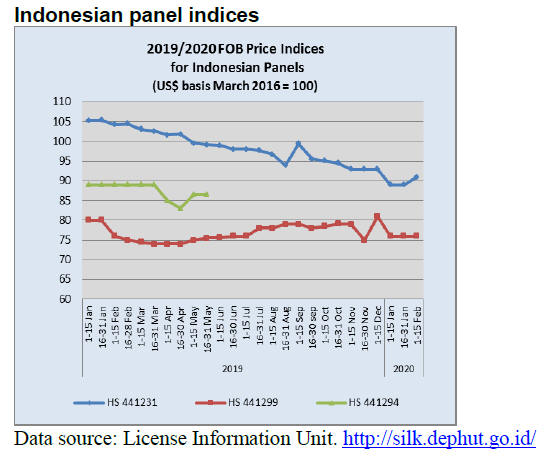
5.
Myanmar
Myanmar authorities ready to cooperate
with investigation in Holland
Police in the Netherlands have seized a shipment of what is said to be
Myanmar teak that was being transported from the Czech Republic. The police
followed up with raids of several locations in Holland.
When asked for comment, Barber Cho, Secretary of Myanmar Forest
Certification Committee ( MFCC) said that he was particularly upset about
the way this has been reported with headlines such as “Dutch police seize
allegedly illegal Myanmar teak”.
He said that readers will not pay due attention to “Allegedly” but will
focus the phrase “Illegal Myanmar Teak”.
Cho further said he welcomes a full investigation of this case and is
willing to offer assistance to the authorities in Holland, adding the
documents, which are provided for consignments leaving Yangon Port in
Myanmar can readily be traced to determine who and how this consignment was
shipped.
He pointed out that problems, such as the current one, could happen with any
consignment as the system in Myanmar for verification of legality is not
acceptable to EU authorities.
Under the EU Timber Regulation (EUTR) importing wood without acceptable
supporting documents showing a clear chain of custody, including the origin
of the timber are required this has been a persistent issue in the Myanmar
teak trade with the EU.
Cho reiterated that the documents with shipments provide information on the
shipper, the quantity in exact number of pieces and the cubic ton (CBT).
Myanmar applies only volumetric weight ton - known as Cubic Ton which is
equivalent to 50- Cubic Foot.). Shipping documents can readily be checked
against relevant documents issued by Forest Department.
Cho pointed out that, provided importers in EU keep track of the documents
and carefully record any transfer of goods, the EU authorities can check
whether the products are exported in accordance with the existing
regulations in Myanmar.
But, even if inspection takes place at the first ‘Point of Entry’ in EU the
documents provided by Myanmar exporters and the relevant Myanmar authorities
still do not overcome the issue of Myanmar’s legality verification system
being unacceptable to the EU. Under these circumstances any shipment can be
controversial.
Cho further explained that MFCC website has information on legality
certificates issued by the independent Certification Body and any EU
Competent Authority and anyone can communicate with the Certification Body
in Myanmar or the MFCC.
Details of legality certificates issued to-date can be viewed at:
www.mfcc.org.mm. However, at this initial stage of introducing the
certification system not many certificates have been issued and therefore
consignments are shipped with all supporting documents.
The MFCC is to review and revise the current MTLAS aiming to close the gaps
which are already identified and to further strengthen MTLAS to comply with
the EUTR. MTLAS and the independent certification bodies in Myanmar were
established specifically to meet the requirements of the EU and would
welcome further cooperation with the EU in order to satisfy the EUTR
requirements.
For the moment, MTLAS Certificate is voluntary and it is up to the exporters
to apply MTLAS certificates.
Cho has said he looks forward to seeing a detailed investigation of the
current case in the Netherlands and hopes the results will be widely
publicised so the lessons can be learned.
Legality – as seen from Europe
The issue of verifying the legality of timber exports from Myanmar from an
EU perspective is discussed on page 20 .
Here the correspondent reports, “At their December meeting, the EU Expert
Group on EUTR and FLEGT, comprising representatives of the EC and government
authorities from across the EU, reiterated their view that it is not
possible to demonstrate a negligible risk that any timber from Myanmar is
legally harvested in line with EUTR definitions”. According to the Expert
Group this is due to a “lack of sufficient access to the applicable
legislation and documentation from governmental sources”.
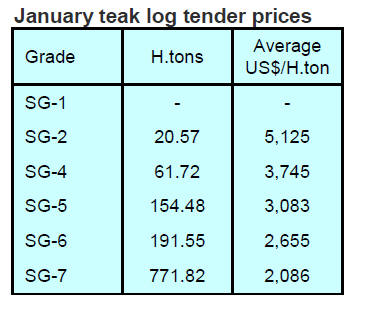
6. INDIA
Lower prices for sawnwood and veneer
push down price indices
The official Wholesale Price Index for ‘All Commodities’ (Base: 2011-12=100)
for December 2019 rose slightly to 122.8 from 122.3 from the previous month.
The index for the group 'Manufactures of Wood and of Products of Wood and
Cork' declined further to 133.1 from 133.3 for the previous month mainly
due, once again, to lower prices for sawnwood.
The annual rate of inflation based on monthly WPI in December 2019 stood at
2.59% compared to 3.46% in December 2018.
The press release from the Ministry of Commerce and Industry can be found
at:
https://eaindustry.nic.in/pdf_files/cmonthly.pdf
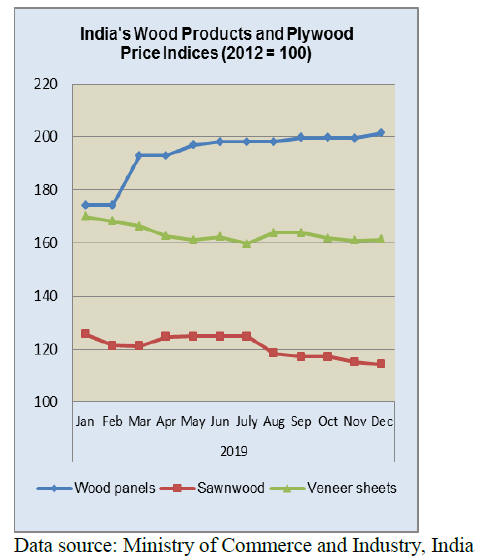
Bihar government to expand raw material
sources for timber industries
The Bihar Government has instructed officials to prepare plans to expand the
forest cover so as to promote expansion of the local veneer and plywood
processing sector. This plan, it is understood, will include suggestions to
strengthen the investment promotion policy developed in 2016.
The Bihar Industries Association president, Sanjay Goenka, was asked to seek
suggestions from the wood processing sector on how to attract investment.
Goenka suggested the creation of large scale plantations of poplar and semal
(Ceiba) which are suited for small scale wood lots that can generate income
for farmers and can be the raw material for industries.
Association members called on the local government to use locally
manufactured wood products for government construction projects.
Furniture sector to be protected by import duties
The Indian Finance Ministry is considering raising the import duty on
furniture to shield domestic companies from the fierce competition from
imports.
Finance Minister, Nirmala Sitaraman, has called for protection to be offered
to furniture SMEs as they are labour intensive and competition from imports
could impact employment security in the sector.
She said cheap and low quality imports will slow development of the domestic
furniture sector. The plywood and wood panel industry has welcomed the
Minister‘s comments.
Furniture imports have increased since India signed various Free Trade
Agreements but these agreements are undermining the local industries, said
the Minister.
Plantation teak prices
Prices for plantation teak remain steady and the recent budget that is
focused on lifting consumption could benefit teak importers.
However, the possible impact of the current coronavirus outbreak has
everyone on edge even though it is difficult to foresee how this will impact
either supply or demand. It may well be that increased uncertainty alone is
enough to impact demand.
Since the beginning of February the rupee has weakened slightly and is
trading between Rs.71 and Rs.72 to the US dollar.
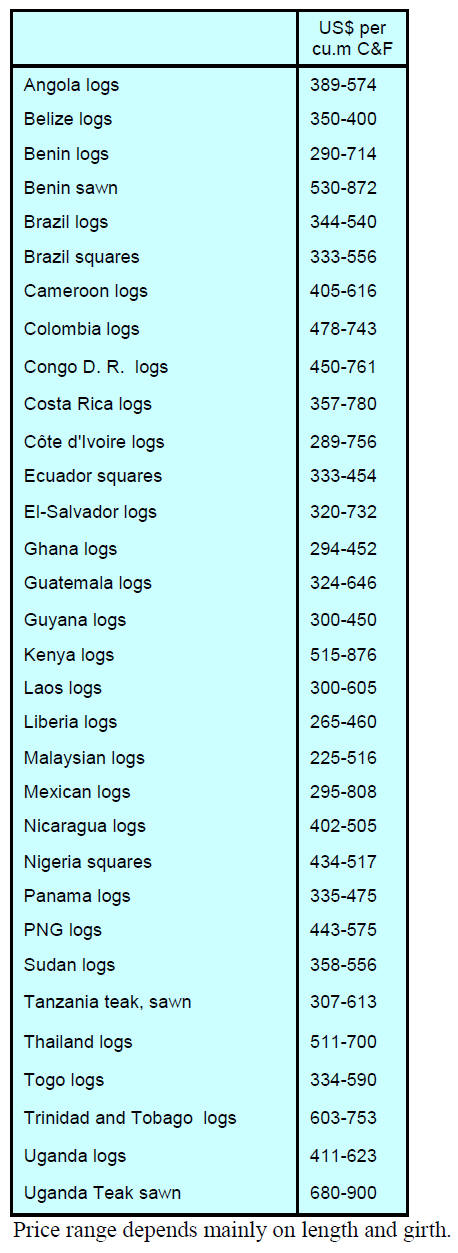
Locally sawn hardwood prices
Prices remain as reported at the end of January.
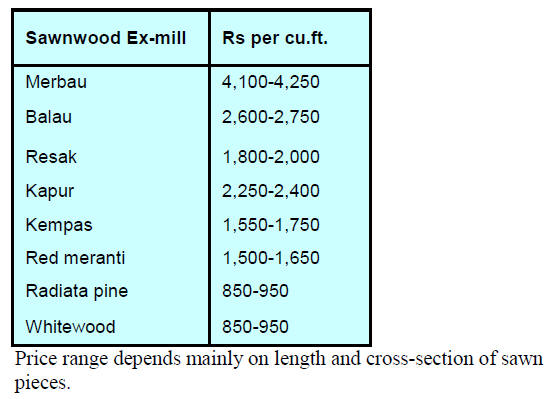
Myanmar teak prices
The Central Government has released the 2020 budget and this has elements
that support the housing sector. There are also specific advantages for low
and middle income home buyers who have not yet been attracted to purchase
the affordable homes that are available.
Myanmar teak is primarily used in top end housing developments and as such
consumption is little affected by either exchange rates or interest rates.
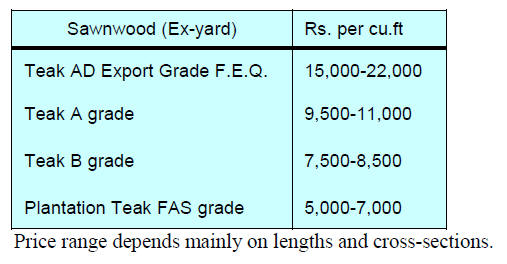
Sawn hardwood prices
Analysts report that there appears to be a strengthening of demand for
imported US timbers but that this has not filtered down to impact prices. US
hardwood exporters are keen to develop the Indian market to diversify away
from dependence on the Chinese market.
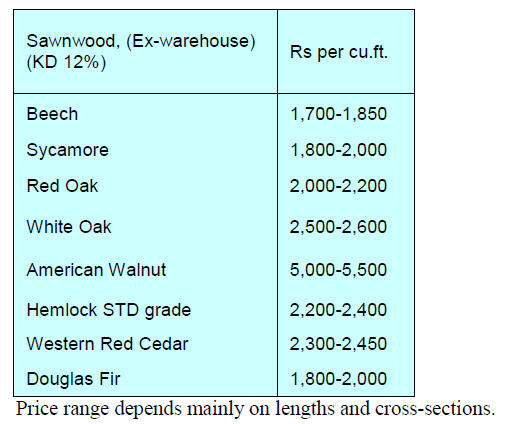
Plywood
Plywood prices remain as reported at the end of January. Analysts report
that manufacturers have benefitted from competition between veneer shippers
so profit levels have stabilised.
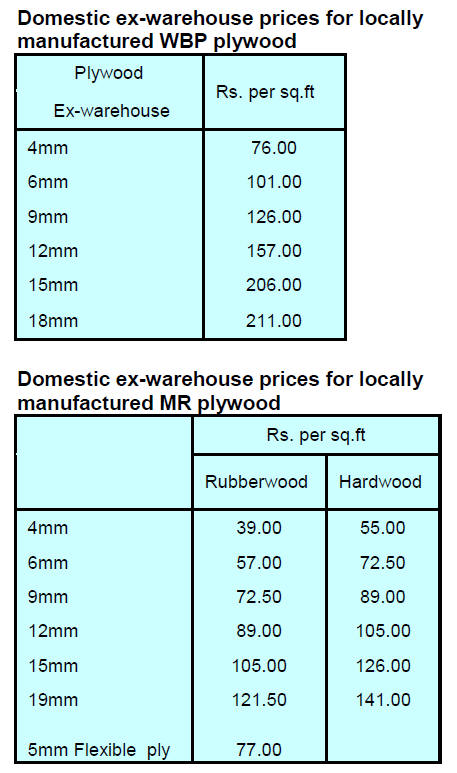
7.
VIETNAM
Exports set to plunge
Nguyen Bich Lam, Director General of the Statistics Office has estimated
that Vietnam’s first quarter 2020 exports could be down around 20% from the
same period last year as trade will be disrupted by the coronavirus
epidemic.
The decline in exports is expected to affect a range of exports including
agricultural and forestry products, aquatic products, textiles and garment,
footwear and electronics. Exports to China are likely to be severely
affected he said. In January foreign trade was down almost 13% and exports
dropped almost 16% year on year.
In response measures to support exports as a result of the suspension of
cross-border trade with China are being considered. The Director General of
the Foreign Trade Agency in the Ministry of Industry said Vietnam could see
a loss of around US$200-300 million in export revenue from declines in
agricultural, forestry and fisheries exports.
This could rise to US$600-800 million if the outbreak lasts half a year.
See:
https://en.vietnamplus.vn/vietnams-exports-forecast-to-plunge-in-q1/168202.vnp
According to VIFORES, there are currently 867 foreign enterprises in the
wood processing sector in Vietnam of which 161 are Chinese companies
processing and exporting wood products from Vietnam.
Around 20% of these companies are in the services and distribution isectors.
Due to current coronavirus outbreak Chinese businessmen and workers are not
permitted to enter Vietnam and this is seriously affecting business
operations of the Chinese enterprises as well as domestic companies
providing services.
Because of the coronavirus many timber sector events such as VIFA Expo, VIFA
GU and the Hanoi Wood 2020 scheduled for the first half of 2020 have to be
postponed.
Local authorities urged to plant
At the end of 2019 the total forest area with national sustainable forest
management certificates reached 269,163 ha. across 24 provinces according to
the Director general of the Forestry Department.
He added that over the past year around 240,000 ha. of new plantations were
established. To achieve the goal of 220,000 hectares of planted forests in
2020 the forestry sector has instructed local authorities to promote
planting to increase the availability of raw material for the production of
added value wood products for domestic consumption and export.
See:
https://en.nhandan.org.vn/business/item/8388302-measures-to-promote-sustainable-forest-development.html
Better business environment to raise competitiveness
The Government has issued a new Resolution (No. 02/NQ-CP2020) which seeks to
improve the business environment so as to raise national competitiveness so
that Vietnam’s businesses can compete more effectively in international
markets.
This Resolution requires ministries and agencies to publish the revised and
simplified administrative procedures related to the issuance of business
certificates.
The Resolution also assigns Chairpersons of provincial People's Committees
to oversee implementation of the regulations and strictly regulate officials
and civil servants.
See:
https://en.nhandan.org.vn/business/item/8392002-new-measure-for-business-environment.html
8. BRAZIL
ABIMCI Sectoral Study-2019
2019 was a good year for the Brazilian Association of Mechanically-Processed
Timber Industry (ABIMCI). The Association started a dialogue with the new
Federal government and also launched its new Sectoral Study presenting the
current situation in the timber sector and business opportunities in the
domestic market.
The study shows that, although the sector faced subdued domestic demand, the
sector has made some advances as the government has worked to improve the
business climate through measures that encourage economic growth and
consumption.
These measures include reducing bureaucracy; revision of NRs (Regulatory
Standards for Safety and Health at Work); simplification of “e-Social”
(Digital Bookkeeping System for Tax, Social Security and Labor Obligations)
and simplification of “Block K” (Digital Tax Bookkeeping of ICMS and IPI).
These measures, along with the increase in entrepreneurs and consumers’
confidence, pave the way for a more prosperous year ahead with greater
business opportunities for the entire timber sector. For 2020, expectations
are promising. The Association has pledged to continue to assess the needs
of member companies and defend the interests of the timber sector in Brazil.
Use of drones for mapping and scaling
The use of drones in forestry is a trend in the sector's automation process
and this strengthens forest planning as access to remote areas has been made
possible according to Embrapa (Brazilian Agricultural Research Corporation).
For example, mapping forests manually is time-consuming and costly but
aerial images taken by drones saves time and money. Tests have been
conducted on using drones to assess volumes of stacked wood according to
Embrapa.
According to a study, in order to measure piled wood in the forest, a drone
flies over the stacked wood and captures images that make it possible to
obtain volume estimates. This methodology was tested on a 1,000 cu.m of
roundwood in Rio Branco municipality in Acre State.
The tests carried out in the National Forest of Jamari (RO), in partnership
with the Brazilian Forest Service (SFB), proved the efficiency of the drone
methodology using drone in log scaling.
See:
https://blogs.canalrural.com.br/florestasa/2020/01/28/uso-de-drones-otimiza-atividades-florestais/
Growth in domestic furniture demand
The November/December 2019 report ‘International Trade of the Furniture
Sector in Brazil’, published by IEMI (Market Intelligence Institute), shows
that furniture production in Rio Grande do Sul State grew 1.7% compared with
the same period of the previous year.
This growth was at a faster rate than registered in the national furniture
industry.
The report also shows exports declined in December by 18% to US$ 15.6
million. The three Southern States of Santa Catarina, Rio Grande do Sul and
Paraná accounted for 85% of the total value of furniture exported in the
period. A further 11% was shipped from Săo Paulo State.
The top furniture markets for exporters in Rio Grande do Sul state were
Uruguay (17.5%), the United States (16%) and the United Kingdom (14%). A
sharp increase in exports to Mexico was recorded.
Brexit and EU wood product quotas
This year ABIMCI started a dialogue with the Brazilian Ministry of Foreign
Affairs (MRE) to define the positioning of the sector due to changes in the
quota system for timber products exported by Brazil to the European Union
and the United Kingdom.
Because of Brexit the volumes and percentages in the existing quotas will be
reassessed and may undergo changes in each timber product segment.
The MRE requested ABIMCI’s participation in the quota negotiations as the
Association’s input will be useful for the Brazilian government to explain
the country's position. The Association considers it important to
participate in this process so that any changes that may be made for each
product are as close as possible to the trade practices relating to pricing
and legal concerns.
The expectation is that the changes will not happen in 2020. ABIMCI
anticipates that one of the Brazilian wood products that may have its quota
rearranged is pine plywood as the UK is one of the main markets for this
product.
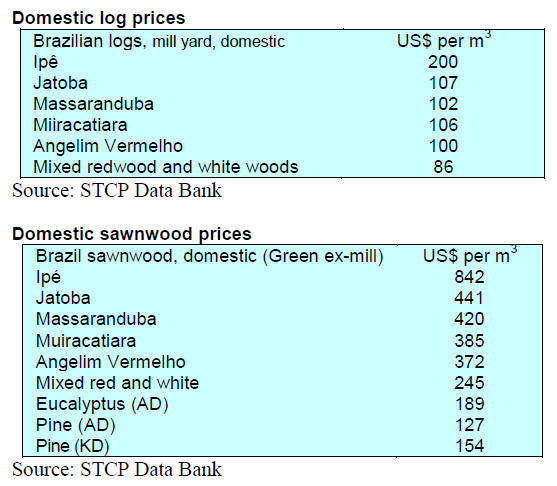
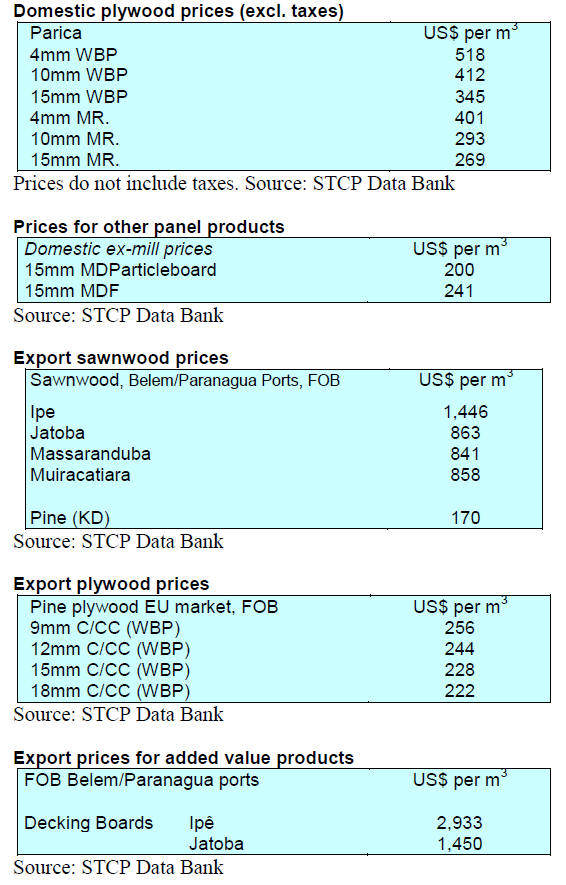
9. PERU
8 million hectares of forest to be
allocated for investors
It has been reported that this year the Government plans to award around 8
million hectares of forests to private investors. The allocations will be
for logging concessions, ecotourism, conservation and for commercialising
ecosystem services.
This proposal was submitted by the National Forest and Wildlife Service (Serfor)
as a means to reduce persistent deforestation and combat illegal logging. It
is planned that allocations of logging concessions will begin in April and
will be based on the technical and financial capacity of the applicants
among other requirements.
In related news, to curb migratory agriculture which, it is said, is the
cause of most of the deforestation in Peru, and is practiced by some 125,000
families occupying over 1.3 million hectares Serfor needs government
approval for an investment programme with the German bank KfW, a German
state owned development bank based in Frankfurt.
"The German resources will allow the implementation of a range of projects
for communities creating conditions to attract private investment in for
example, the development of forest plantations according to Serfor.
San Martín the first in achieving forest zoning
The San Martín Region was the first to conclude the forest zoning exercise.
In San Martín it has been determined that 85% of the region’s territory has
the potential for development according to Serfor.
The authorities in San Martín region have delimited areas to be allocated
for the various functions such as conservation concessions, ecotourism,
exploitation of timber and non-timber products, wildlife, plantations as
well as agro-forestry and silvo-pastoral.
The forest zoning process has the financial support of the Norwegian
government in the framework of the Joint Declaration of Intent, a
results-based payment agreement signed by Peru, Norway and Germany.
For more see:
http://www.bosques.gob.pe/archivo/23-apoyo-dci-wwf-pncb-norad.pdf
